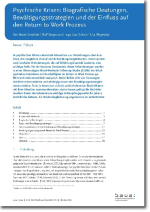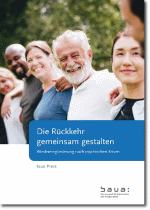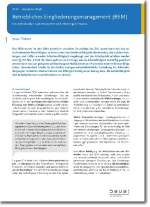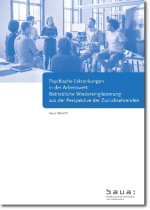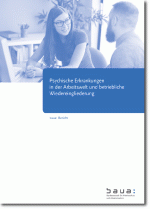- Project number: F 2386
- Institution: Federal Institute for Occupational Safety and Health (BAuA) / e-fect dialog evaluation consulting eG
- Status: Completed Project
Description:
Mental illness is the second leading cause of inability to work, being the reason for twice as many absences from work as other illnesses; mental illness also increases the risk of unemployment and is the most common reason for applications for a disability pension. It is therefore important to understand how the ability to work can be maintained following a case of mental illness.
In this context, the BAuA 18 months mixed-methods follow-up study not only examined the time of the return to work, but focused especially on the individual work-related factors that influence a sustainable return to work. In the qualitative sub-study, the experiences, behaviour and actions of 32 persons in the Return to Work (RTW) process were examined through narrative-generating interviews. These included the following questions: How do the interviewees experience their mental crisis over the course of time? How do the specified factors influence their return to work and why?
The following conditions concerning the development of a mental crisis were derived from the interview data: overwork due to
- working conditions and the personal approach to work (15 of 32),
- private and biographical conditions (5 of 32) or
- a combination of (1) and (2) (12 of 32).
During their mental health crisis, all the interviewees demonstrated a high preponderance to overexert themselves, a limited ability to set boundaries and low rates of personal care. Two groups of returnees were indetified: Among other factors, the returnees differ in terms of their RTW self-efficacy and the associated need for support. In this respect, self-efficacy refers to the personal belief on the part of the returnees that they can cope with difficult work situations and the challenges associated with them. The group with low RTW self-efficacy requires a greater level of professional support on returning to work than the other group. In addition to RTW self-efficacy, the following factors are of relevance to the experiences, behaviour and actions in the RTW process and therefore, to a successful return to work:
- a prosocial, i.e. a helpful, encouraging coping by the employee to deal with the working environment,
- support from supervisors and colleagues and
- willingness on the part of employers to reduce excessive sources of stress and strain through measures in the field of occupational safety and health.
In this respect, the sustainability of the return to work is demonstrated, in particular, by an improved performance and ability to cope with stress, a confident approach to the illness, a regained degree of emotional stability, a supportive working atmosphere and a good work/life balance.
